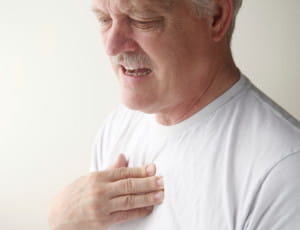Chest pain: A sign you shouldn't ignore

Although you should always seek medical attention for chest pain, it is good for patients and the public to have an understanding that there may be both typical and atypical presentations for heart disease.
Sudden onset of chest discomfort is always a cause for immediate medical attention. Typical heart attack pain is located in the front left chest or beneath the breast bone. It is usually an aching sensation of moderate intensity, although it can be present differently in various individuals.
Heart attacks which usually result from the abrupt closure of one of the arteries supplying the heart muscle are not necessarily exertion related. Such chest discomfort requires immediate attention and possible intervention in an attempt to save additional heart muscle damage.
A more gradual disruption of blood supply from atherosclerotic plaque may cause chest discomfort that is associated with exertion. This, too, warrants the prompt medical attention of a cardiologist, a physician who has specialized in the diagnosis and treatment of heart disease.
Chest discomfort associated with the disruption of blood supply to the heart is most commonly described as:
- Pressure or tightness in the front left chest or beneath the breast bone
- Discomfort that may radiates to the back, neck, jaw, left shoulders or left arm
- There may be a “stuttering” course of pain that lasts for a few minutes, goes away, and returns
- Discomfort varying in intensity from a mild aching sensation to more severe
- Shortness of breath, dizziness, passing out, or nausea
Heart disease risk factors, including smoking, diabetes, high blood pressure, high cholesterol and a family history are all important in identifying patients at risk, but the absence of these factors doesn’t eliminate the possibility that you are at risk for a heart attack.
There are other forms of chest pain that are also cause for concern and need immediate medical attention, including:
- Inflammation around the heart
- Blood clot to the lungs
- Lung diseases like pneumonia, collapsed lung or lung cancer
Chest pain in lung-related conditions often intensifies when you breathe deeply or cough.
When you’re experiencing any chest pain, don’t delay in seeking medical care. Trying to diagnose yourself and delaying a visit to the emergency room can result in serious heart damage or even death, risks that can be avoided or limited when you seek immediate medical care. Always play it safe and call 911.
All four Main Line Health hospitals are home to accredited chest pain centers. If you or a loved one is experiencing chest pain, contact your physician immediately and head to the nearest medical center, where a trained staff can help address the causes and treatment.
 Content you want, delivered to your inbox
Content you want, delivered to your inbox
Want to get the latest health and wellness articles delivered right to your inbox?
Subscribe to the Well Ahead Newsletter.
